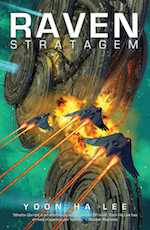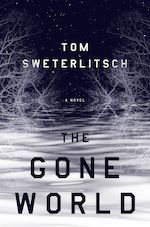 Red Right Hand by Levi Black
Red Right Hand by Levi BlackMy rating: 3 of 5 stars
Of all the things Neil Gaiman has ever written, I think that American Gods is the best. not everyone will agree with me, of course; there are those who firmly believe the Sandman graphic novel series is his best creation, while others are going to say Neverwhere, or Stardust (which trades places sometimes with American Gods in my personal list of Neil Gaiman’s Greatest Hits). Yet others might point to his young adult books like Coraline and The Graveyard Book, while others might say that his short story collections like Smoke and Mirrors and Trigger Warning are the best. And while all of those works have their own individual merits, I still think that American Gods is the best.
It’s rather hard to explain why, though. A lot of it has to do with personal bias (which might come from the fact that I picked up American Gods at just the right moment in my life when I was most open to it and when it most appealed to me), but I also think I just like the idea of gods walking among humanity, unseen and unacknowledged, waging a war of their own and with nobody the wiser. The idea of the divine, the supernatural, coexisting invisibly with the mundane is something that thoroughly appeals to me as a reader, which is why American Gods was my gateway drug the genre of urban fantasy.
It’s because of this interest in the genre - along with an interest in H.P. Lovecraft’s Cthulhu Mythos - that I chose to pick up Red Right Hand, the first book in the Mythos War series by Levi Black. It follows the story of Charlie Tristan Moore, a woman who has been through hell and back and has tried very, very hard to forget a very dark time in her past. But just when she thinks couldn’t be any worse, ferocious dogs that look like they have been flayed show up in the house she shares with a few friends. Fearing that her friends are all dead and that she will be next, she tries to flee, but the skinless dogs corner her and get ready to rip her throat out.
But then, at the very last minute, a mysterious Man in Black with a strange, red right hand comes from out of nowhere and saves her - but her rescue does not come without a price. For the Man in Black is an Elder God who walks amongst humans, and in exchange for saving her he wants Charlie to help him in his quest to make war upon his fellow Elder Gods in order to stop them from destroying humanity entirely. Accompanied by Daniel, an acquaintance of Charlie’s whom the Man in Black holds as hostage to ensure her obedience, the three of them seek out the other Elder Gods in order to stop the coming apocalypse - but is that what the Man in Black really wants?
One of the first things that drew me to this novel was the choice of protagonist. It’s not often that women headline stories based in the Cthulhu Mythos - Lovecraft himself did not write any female protagonists, and it can be hard to find books in the spirit of the Mythos that have women as primary characters. That has been changing lately, fortunately, as authors push back against Lovecraft’s misogynistic and racist politics by featuring people of colour and women as prominent characters in Mythos-based stories.
Red Right Hand is one of those books - though Charlie is not immediately a likeable character. She has a past that has done a number on her outlook on and approach to life, and I am certain that quite a few readers out there will not like her at all. The following excerpt is a good illustration of why some readers might not like Charlie:
Guilt stabbed deep as I remembered pushing Thom to tie off, to shoot up, to nod away. He’d been headed there before me, but I needed him to give me painkillers and company without the threat of sex. Threat is the wrong word. He was too nice to push, never would if I’d given him the chance, but he’d want it, all boys do, and I just couldn’t. Just before he would drop all the way gone, he would loll his head over, give me his crooked smile, pat my arm, and say, Don’t worry, babe, you’re always gonna be my heroin.
I wasn’t proud of what I’d done. Not at all. I hurt, and I saw a way out of it and, at the time, couldn’t see anything besides that. It only lasted a few months. I got Thom to NA before I parted ways with him, but it was still shitty of me.
Shittiest thing I’ve ever done in a long list of shitty things.
Terrible person.
Don’t judge me.
While the above situation is utterly reprehensible, it is also very much in keeping with Charlie’s state of mind after the traumatic event that precipitated her downward spiral in the first place. Said traumatic event certainly does not excuse her terrible treatment of Thom, but at least Charlie has enough self-awareness to realise that what she has done is wrong, and tries to make amends for it in whatever way she can - up to and including leaving Thom so she does not destroy him further.
This is also why I like Charlie: she’s not perfect. As I may have mentioned elsewhere, I am always interested in flawed characters, especially flawed female characters, and Charlie is a good fit for that description. She is not a good person - indeed she admits that she is a “terrible person” - but she does what she can to do what is right. That, in the end, is all anyone can really ask of anyone else: that when the time comes, he or she will rise above their own self-absorption and selfishness and do what is right for others, even if it means hurting himself or herself in the process.
Equally intriguing are the Elder Gods present in this novel. While keen readers of the Mythos and Mythos-related stories probably already know who the Man in Black really is, there are other Elder Gods in this novel, and some of them are presented in some rather unexpected ways - ways that might even feel out-of-character for said Elder Gods. However, if the reader is willing to let their mind wrap around the strangeness of seeing these Elder Gods portrayed in ways he or she is unaccustomed to, then he or she might find himself or herself actually rather amenable to the alterations made. Mileage will, of course, vary from reader to reader, but readers who are flexible about what is and is not permitted within the context of the Mythos will likely get a kick from reading these Elder Gods portrayed rather differently.
Unfortunately, the aforementioned aspects of this novel are not enough to save it from the plot and the overall style used in its telling. While I appreciate a sense of urgency in more action-oriented stories, the first two-thirds of this novel feel like the author is forcefully driving the characters from one action scene to another in order to reach the latter third. It makes reading the first two-thirds of the novel more of a duty than anything else, as the reader chases the inherent potential that is visible in those first two-thirds, but does not really flower until the latter third.
The above does no wonders for the romantic subplot, either, since it is given no time to grow and develop properly. This means it feels completely inauthentic to the point of unnatural by the time it becomes significant to the plot. I have nothing against romantic subplots in general, since they can do wonders for character development and, in the hands of a capable writer, really push a plot forward instead of slowing it down. Unfortunately, that is not the case in this novel; the entire romantic subplot could be done away with and it would still read as essentially the same plot and story. Truth be told, I wish that had been the case; I would have rolled my eyes far less often if it were so.
Overall, Red Right Hand has elements to it that are very promising indeed - specifically, the flawed female lead character and the new take on certain well-known Elder Gods and the Cthulhu Mythos as a whole. Unfortunately, these elements are hobbled by a plot that is not really that compelling until the latter third, and further marred by a romantic subplot that does not make any great difference to the plot as a whole. While I am still somewhat curious to find out where the rest of the series will go after this book, I am significantly less eager to pick up the second book after reading this one. Other readers will likely feel the same way as I do.

